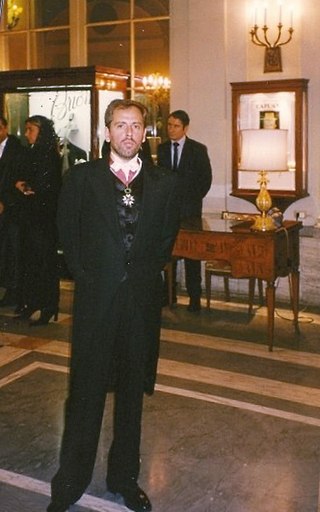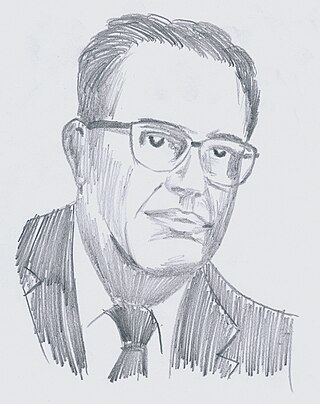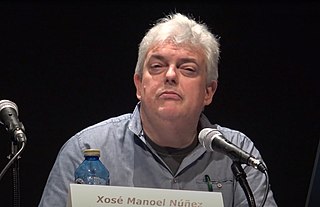
Gaucho literature, also known as gauchesco ("gauchoesque") genre was a literary movement purporting to use the language of the gauchos, comparable to the American cowboy, and reflecting their mentality. Although earlier works have been identified as gauchoesque, the movement particularly thrived from the 1870s to 1920s in Argentina, Uruguay and southern Brazil after which the movement petered out, although some works continued to be written. Gauchoesque works continue to be read and studied as a significant part of Argentine literary history.
Manuel García Pelayo, prominent Spanish political scientist and jurist. He was the founder of the modern Department of Political Science of the Central University of Venezuela and was elected President of the Constitutional Court of Spain in 1980.

Juan Nepomuceno Silva Meza, son of the writer Juan Silva Vega and professor Ana María Meza de Silva, is a Mexican jurist. He served as an Associate Justice (ministro) of the Supreme Court of Justice of the Nation since 26 January 1995, having previously served extensively elsewhere in the judiciary, including the Federal Electoral Tribunal. On 3 January 2011, he was elected Chief Justice for a term that ended on 31 December 2014.

Joaquín Ruiz-Giménez Cortés was a Spanish politician and jurist. He was minister of Education under Franco (1951-1955) but he drifted apart from the Francoist State since 1956 and, adopting a Christian Democrat position, steadily started to promote a quiet transition to democracy, especially through Cuadernos para el Diálogo magazine. He was considered one of the most relevant figures of the moderate inner opposition to Francoism. Failing to play a relevant role during the 1977 democratic elections, he was later elected as the first Spanish Ombudsman.

The Centre for Political and Constitutional Studies, previously known as the Institute for Political Studies, is an autonomous agency associated with the Ministry for the Presidency of Spain.

Daniel Esteban Herrendorf is an Argentine writer, essayist and philosopher.

John of Castile, called the "el de Tarifa" was an infante of Castile and León. He was engaged in a decades-long fight for control over the Lordship of Biscay with Diego López V de Haro, the uncle of his wife.
Federico Martínez Roda is a professor of history at the Valencia Catholic University.

Francisco Tomás y Valiente was a Spanish jurist, historian, and writer. He was professor of history of law in the Autonomous University of Madrid. He presided Spain's Constitutional Court from 1986 to 1992. He was assassinated by ETA in 1996.

Francisco Elías de Tejada y Spínola Gómez was a Spanish scholar and a Carlist politician. He is considered one of top intellectuals of the Francoist era, though not necessarily of Francoism. As theorist of law he represented the school known as iusnaturalismo, as historian of political ideas he focused mostly on Hispanidad, and as theorist of politics he pursued a Traditionalist approach. As a Carlist he remained an ideologue rather than a political protagonist.

Centro de Estudios Públicos (CEP) is a non-profit Chilean think tank founded in 1980. Its stated mission is to “contribute to the development of a free and democratic society” through: 1) the analysis and dissemination of philosophical, political, social and economic problems of interest to Chilean society; 2) the study, discussion and design of public policies; and 3) the promotion of institutions that support and enable the existence of a constitutional and democratic order. CEP contributes to the public debate through its seminars, the policy brief Puntos de Referencia, the journal, Estudios Públicos which has appeared continuously since 1980, the publication of books and various research studies, as well as social surveys, which have been conducted since 1987. CEP has become a household name for political, academic, and intellectual debate.
Joan Oliver Araujo is a Spanish author, who holds the chair of Constitutional Law in the University of the Balearic Islands (UIB).

Rosa Cobo Bedía is a Spanish feminist, writer, and professor of sociology of gender at the University of A Coruña. She is also the director of the Center for Gender Studies and Feminists at the same university. Her main line of research is feminist theory and the sociology of gender.

Santiago Muñoz Machado is a Spanish jurist and academic, director of the Royal Spanish Academy and the Association of Academies of the Spanish Language since 10 January 2019. As a jurist, he specialized in administrative and constitutional rights. He is also a member of the Royal Academy of Moral and Political Sciences and editor of the Diccionario del español jurídico and the Diccionario panhispánico del español jurídico.

José Félix Tezanos Tortajada is a Spanish sociologist, politician, and professor. He serves as President of the Centro de Investigaciones Sociológicas (CIS) since 2018.

José María "Txema" Portillo Valdés is a Spanish historian, professor of Contemporary History at the University of the Basque Country. He is an expert in the Spanish constitutional history.

Javier Moreno Luzón is a Spanish historian, professor of the History of Thought and Social and Political Movements at the Complutense University of Madrid. He is an expert in the political history of Restoration Spain.
Miguel Artola Gallego was a Spanish intellectual and historian. He was born in San Sebastián, and died, aged 96, in Madrid.

Xosé Manoel Núñez Seixas is a Spanish historian who specializes in nationalism studies, the cultural history of war and violence, and migration studies.
Manuel B. García Álvarez is a Spanish jurist and emeritus university professor, of the department of Constitutional Law of the University of León. He was the first Ombudsman of Castile and León between 1995 and 2005.














